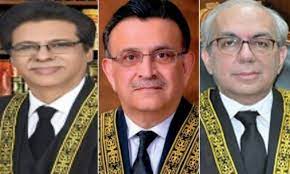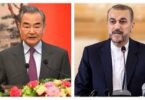F.P. Report
ISLAMABAD: The Supreme Court has ordered the Election Commission to hold elections in Punjab and Khyber Pakhtunkhwa within 90 days.
The verdict was split 3-2 with Justice Mansoor Ali Shah and Justice Jamal Khan Mandokhail dissenting with the majority verdict. CJP Umar Ata Bandial, Justice Munib Akhtar and Justice Muhammad Ali Mazhar supported the ruling.
About its suo motu notice regarding delay in announcement of poll date for elections in Punjab and Khyber Pakhtunkhwa, the apex court ruled that the President can announce a date for holding elections if the governor opts not to dissolve the assembly.
The larger bench declared that the poll date of April 9 set by the President for elections in Punjab will be effective while for KP the apex court struck down the President’s vote date.
The court further ruled that if the elections are not possible on April 9 in Punjab then the ECP in urgent consultation with president and the governor can fix a new date for polling.
The court remarked that the KP governor by not announcing the election date has negated his constitutional duty. The KP governor must have unveiled an election date after dissolving the assembly, the court added.
“If the governor dissolved the assembly then the governor will announce the election date,” ruled the court.
The short verdict said that the Election Commission of Pakistan failed in discharging its role in the election.
The Supreme Court declared that the ECP is bound to consult with the governor and the president.
The apex court directed all the stakeholders including the federal government to assist the ECP in holding the elections.
Pronouncing its judgement reserved a day earlier, the five judge larger bench of the apex court through a split verdict declared that holding elections within 90 days is mandatory in accordance with the Constitution, shooting down all suggestions to delay the elections for two provincial assemblies.
The verdict was announced by Chief Justice of Pakistan Justice Umar Ata Bandial on Wednesday. Justice Mansoor Ali Shah and Justice Jamal Khan did not agree with the verdict.
File photos of Justice Mansoor Ali Shah (L) and Justice Jamal Khan Mandokhail.
The verdict was reserved yesterday after the day-long hearing of the suo motu proceedings of the case which ended at 5:15pm on Tuesday.
According to the verdict, two members of the bench, Justice Shah and Justice Mandokhail objected to maintainability of the suo motu proceedings and wrote dissenting notes.
The judges who were part of the larger five-member bench headed by Chief Justice of Pakistan Bandial were included: Justice Mansoor Ali Shah, Justice Munib Akhtar, Justice Jamal Khan Mandokhail, and Justice Muhammad Ali Mazhar.
Dissenting note of Justice Shah and Justice Mandokhail
In their joint dissenting note, Justice Shah and Justice Mandokhail wrote that the suo motu proceedings were “wholly unjustified in the mode and manner they were taken up under Article 184(3) of the Constitution.
“There is no justification to invoke our extraordinary jurisdiction under Article 184(3) to initiate suo motu proceedings or entertain petitions under Article 184(3) of the Constitution, as a single Bench of the Lahore High Court has already decided the matter in favour of the petitioner before the said High Court vide judgment dated 10.02.2023 and the said judgment is still in the field. The intra-court appeals (ICAs) filed against the said judgment are pending before the Division Bench of the Lahore High Court (and none of the said petitioners has approached this Court under Article 185(3) of the Constitution).”
The judges went on to say since a constitutional issue was pending before a high court then the matter “should not be readily interfered with rather be supported to strengthen the provincial autonomy and avoid undermining the autonomy of the provincial constitutional courts.
“There is no inordinate delay in the proceedings pending before the high courts, in fact the instant proceedings have unnecessarily delayed the matter before the High Courts. However, considering the importance of the matter we expect that the respective high courts shall decide the matters pending before them within three working days from today.”
The judges suggested “even otherwise without prejudice to the above, such like matters should best be resolved by the Parliament”.
“We, therefore, agree with the orders dated 23.02.2023 passed by our learned brothers, Yahya Afridi and Athar Minallah […] and dismiss the present constitution petitions and drop the suo motu proceedings,” the dissenting note concluded.
Courtroom packed ahead of verdict
Before the announcement of the verdict, Court Room No.1 where the much-awaited verdict was announced, was crowded with media persons, lawyers and politicians. PTI leaders including Shireen Mazari and Fawad Chaudhry and Awami Muslim League Chief Sheikh Rashid Ahmad also thronged the place.
The Supreme Court conducted four consecutive hearings of the case starting from Monday. Yesterday, the hearing continued for 7 hours. After hearing arguments from the lawyers of all parties, the court reserved the verdict.
Yesterday’s hearing of the case
During yesterday’s hearing, CJP Bandial advised the Pakistan Tehreek-i-Insaf and the PDM government to sit together and come up with a date for elections in Khyber Pakhtunkhwa and Punjab by 4 pm.
The top judge remarked: “It is compulsory to hold elections. Our priority is to follow the constitution. The hurdles can be removed after the announcement of the election date. If there is any big issue, then parties can resort to the court.”
The CJP went on to say: “No constitutional institution could extend its tenure. Apart from the court, no one could be allowed to extend the (90-day) election period. The court could issue the order after taking into account solid reasons. Article 254 obscures the matter of poll delay but it does not issue a licence to delay the polls beyond 90 days. If elections were not held on time, then stability will not be returned. Nobody is questioning the sincerity of the government. Today, we have to look into the matter regarding the announcement of the date for the elections. If the poll date extends 90-day period, this could be challenged by someone in a court of law.”
The chief justice of Pakistan observed that holding elections within 90 days after the assemblies’ dissolution was the spirit of the constitution.
Attorney General for Pakistan Shehzad Ata Elahi contended that the power to fix the election date was vested in the ECP and if the commission had some evidence of any difficulty in holding the elections, it should not shy away from revealing the same. Justice Munib Akhtar observed that it seemed that the ECP was unaware of its constitutional responsibility to fix the election date and today they stand enlightened of their constitutional obligation.
PPP lawyer Farooq H Naek argued that the PPP did not want the postponement of elections unnecessarily, rather it wanted to participate in it provided they were held in accordance with the law in conducive circumstances. He, however, added that the current economic situation makes it difficult to hold elections.
He said April 9 election date fixed by President Arif Alvi without consultation with the prime minister was a nullity in the law and adding that the discretion, which the president could exercise, was implicit in the constitution.
The AGP argued that the president could give election date only in case of National Assembly’s dissolution or in other words the president could give date for general elections in the country.
Originally, a nine-judge bench was formed to hear the suo motu proceedings but the bench was dissolved on Monday as four of the judges including Justice Ijazul Ahsan, Justice Syed Mazahir Ali Akbar Naqvi, Justice Athar Minallah and Justice Yahya Afridi recused themselves from hearing the case.
The chief justice of Pakistan took suo motu notice of an apparent delay in the elections of the two assemblies on February 23 after President Dr Arif Alvi unilaterally announced April 9 as the election date in both provinces after his invitation for consultations on the matter was rejected by the Election Commission of Pakistan (ECP).
Supreme Court’s written order
The Supreme Court has released the detailed written order of its suo motu proceedings regarding delay in the announcement of election date for Punjab and Khyber Pakhtunkhwa assemblies.
The 13-page order also includes a dissenting note consisting of two pages.
According to the order, by a majority of 3:2 (Mr Justice Syed Mansoor AliShah and Mr Justice Jamal Khan Mandokhail dissenting) and for detailed reasons to be recorded later and subject to what is set out therein by way of amplification or otherwise, these matters are disposed of in the following terms:
“1. Parliamentary democracy is one of the salient features of the Constitution. There can be no parliamentary democracy without Parliament or the Provincial Assemblies. And there can be neither Parliament nor Provincial Assemblies without the holding of general elections as envisaged, required and mandated by and under the Constitution and in accordance therewith. Elections, and the periodic holding of elections, therefore underpin the very fabric of the Constitution. They are a sine qua non for parliamentary democracy, and ensure that the sacred trust of sovereignty entrusted to the people of Pakistan is always in the hands of their chosen representatives.
2. While the holding of general elections has different aspects and requirements, one that is absolutely crucial is the timeframe or period in which such elections are to be held. The Constitution envisages two such periods, being of sixty and ninety days respectively. In relation to a Provincial Assembly, the first period applies when the Assembly dissolves on the expiration of its term under Article 107 and the second period is prescribed when it is sooner dissolved under Article 112. The time periods so set down in Article 224(1) and (2) respectively are constitutional imperatives that command complete fidelity.
We are here concerned with the dissolution of two Provincial Assemblies before the expiry of their terms and therefore to the holding of general elections in relation to each within 90 days.3. It is in the foregoing context that three questions have to be considered by the Court. The Assemblies in question are those of the Punjab and Khyber Pakhtunkhwa Provinces, which dissolved on 14.01.2023 and 18.01.2023 respectively. In both cases, the then Chief Ministers tendered advice to their respective Governors under Article 112(1) of the Constitution to dissolve the Assembly. In the case of the Punjab Province the Governor chose not to act on the said advice so that the Assembly stood dissolved on the expiry of 48 hours, on the date just mentioned. In the case of the KPK Province, the Governor did act on the advice and made an order dissolving the Assembly, on 18.01.2023. The questions which have been considered with the assistance of learned counsel for the various parties and the Law Officers are as follows:
i. Who has the constitutional responsibility and authority for appointing the date for the holding of a general election to a Provincial Assembly, upon its dissolution in the various situations envisaged by and under the Constitution?
ii. How and when is this constitutional responsibility to be discharged?
iii. What are the constitutional responsibilities and duties of the Federation and the Province with regard to the holding of the general election?
4. The Constitution envisages three situations for the dissolution of a Provincial Assembly. These, in the context of the role of the Governor, are as follows.
5. The first situation is set out in clause (2) of Article 112. This envisages the dissolution of the Assembly by an order made by the Governor at his discretion, subject to the previous approval of the President and fulfillment of the conditions set out therein. In this situation, the Assembly cannot, and does not, dissolve without an order being made by the Governor, and dissolves immediately on the making of the order.
6. The second situation is set out in clause (1) of Article 112, when the Chief Minister advises dissolution. This situation can be divided into two sub-categories, which are as follows:
a. The first is where the Governor acts on the advice tendered and makes an order dissolving the Assembly. Here, the Assembly dissolves immediately on the making of the order.
b. The second sub-category is where the Governor does not make an order of dissolution on the advice tendered. Here, the Assembly stands dissolved on the expiry of forty-eight hours from the tendering of the advice by the Chief Minister (i.e., by the efflux of time), and that does not require an order of the Governor.
7. The third situation is set out in Article 107. This provides that unless an Assembly is sooner dissolved (i.e., in terms of either of the two preceding situations), it stands dissolved after a term of five years. Here, the Governor has no role at all; the Assembly dissolves by the efflux of time.
8. Article 105(3)(a) provides that where the Governor dissolves the Assembly he shall appoint a date for the holding of a general election thereto, being a date not later than 90 days from the date of the dissolution.
9. The Elections Act, 2017 (“2017 Act”) has been enacted by Parliament in exercise of its legislative competence under the Constitution. That includes, in addition to Entry 41 of the Fourth Schedule, a specific provision in the body of the Constitution, being Article 222, that expressly articulates a list of matters relating to elections which are within the Federal domain. The 2017 Act applies, inter alia, to both the National and the Provincial Assemblies. Section 57(1) thereof provides that the President shall “announce the date or dates of the general elections after consultation with the Commission”.
10. On a conjoint reading of the foregoing provisions we conclude and hold as follows:
a. In situations where the Assembly is dissolved by an order of the Governor, the constitutional responsibility of appointing a date for the general election that must follow is to be discharged by the Governor as provided in terms of Article 105(3)(a). These are the situations described in paras 5 and 6(a) above.
b. In situations where the Assembly is not dissolved by an order of the Governor, the constitutional responsibility of appointing a date for the general election that must follow is to be discharged by the President as provided in terms of s. 57(1) of the 2017 Act. These are the situations described in paras 6(b) and 7 above.
11. Since the general election on a dissolution of a Provincial Assembly has to be held within a time period stipulated by the Constitution itself, which is a constitutional imperative, the President or, as the case may be, the Governor must discharge the constitutional responsibility of appointing a date for the said election swiftly and without any delay and within the shortest time possible. The Election Commission must proactively be available to the President or the Governor, and be prepared for such consultation as required for a date for the holding of general elections.
12. It follows from the foregoing that in relation to the dissolution of the Punjab Assembly, to which the situation described in para 6(b) above applied, the constitutional responsibility for appointing a date for the general election that must follow was to be discharged by the President. However, in relation to the dissolution of the KPK Assembly, to which the situation described in para 6(a) above applied, the constitutional responsibility for appointing a date for the general election that must follow was to be discharged by the Governor.
13. It further follows that the order of the President dated 20.02.2023 is constitutionally competent and subject to what is observed below, it is hereby affirmed insofar as it applies to the Punjab Assembly; but the same is constitutionally invalid insofar as it applies to the KPK Assembly and is therefore hereby set aside. It also follows that the Governor of KPK Province, inasmuch as he has not appointed a date for the holding of the general election to the Assembly of that Province is in breach of his constitutional responsibility.
14. It is further declared and directed as follows in relation to the matters before the Court:
a. In ordinary circumstances the general election to the Punjab Assembly ought to be held on 09.04.2023, the date announced by the President in terms of his order of 20.02.2023. However, we are informed that on account of the delay in the emergence of the date for the holding of the general election, it may not be possible to meet the 90 day deadline stipulated by the Constitution. It is also the case that (possibly on account of a misunderstanding of the law) the Election Commission did not make itself available for consultation as required under s. 57(1) of the 2017Act. The Election Commission is therefore directed to use its utmost efforts to immediately propose, keeping in mind ss. 57 and 58 of the 2017 Act, a date to the President that is compliant with theaforesaid deadline. If such a course is not available,then the Election Commission shall in like manner propose a date for the holding of the poll that deviates to the barest minimum from the aforesaid deadline. After consultation with the Election Commission the President shall announce a date for the holding of the general election to the Punjab Assembly.
b. The Governor of the KPK Province must after consultation with the Election Commission forthwith appoint a date for the holding of the general election to the KPK Assembly and the preceding clause (a) shall, mutatis mutandis, apply in relation thereto.
15. It is the constitutional duty of the Federation, in terms of clause (3) of Article 148, “to ensure that the Government of every Province is carried on in accordance with the provisions of the Constitution”. There can be no doubt that this duty includes ensuring that a general election to the Assembly of every Province is held, and enabled to be held, in a timely manner within the period set out in the Constitution. This duty is in addition to, and applies independently of, the duty cast under Article 220 on “all executive authorities in the Federation and in the Provinces to assist the Commissioner and the Election Commission in the discharge of his or their functions”. It follows that the Federation, and in particular the Federal Government, is, inter alia, obligated, on an immediate and urgent basis, to forthwith provide the Election Commission with all such facilities, personnel and security as it may require for the holding of the general elections. In like manner, it is the duty of the Provincial Governments, acting under the Caretaker Cabinets, to proactively provide all aid and assistance as may be required by the Election Commission. The duty cast upon the authorities as set out in s. 50 of the 2017 Act must also be discharged forthwith and proactively.
16. The three matters before the Court are found maintainable and stand disposed of as above.
Courtesy: (24news)







